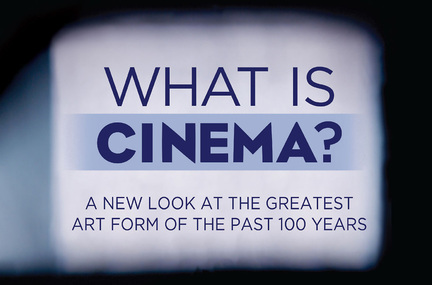Academy Award-winning director Chuck Workman (live action short Precious Images) embarked on the highly ambitious task of exploring “What is cinema?” in just 82 minutes. The film probes this question using clips from many of the most beloved classics, quotes from the likes of Fellini and Bresson, and floating head interviews with filmmakers such as Michael Moore, Chantal Akerman and Kelly Reichardt. This approach is like dulled down film studies with special access to a sampling of filmmaker interviews. What is Cinema? is a barrage of clips and a random sampling of questions and ideas that are never explored even slightly to my satisfaction.
The first issue is that there are a ton of unexplained clips that sometimes occur in rapid succession. Is this merely fan service to cinephiles? I certainly wasn’t satiated. Second, I can’t figure out who is the intended audience for this film. The material is too obscure for mainstream crossover, devoting a surprising amount of time to experimental filmmakers like Ken Jacobs and Yvonne Rainer. Yet I can’t imagine this film is for an art-house audience either, as its ideas are merely cursory. If one has taken the time to watch directors like Bresson, Fellini, and Akerman, then surely they’ve conjured the thoughts put forth in this film. There are quotes and little moments with some of the more regarded directors like Akerman or David Lynch, but What is Cinema? focuses more on others like Jacobs and Rainer. Not to take away from Jacobs and Rainer who are beloved in their universes, but do they deserve center stage in a film that broadly asks, “What is Cinema?” I think not. I think the topic would be better served with not only more notable directors like Murnau, Vertov but also with other parties involved with cinema. Why don’t we speak with festival curators, distributors, or film critics? Is their affection for cinema not relevant?
Despite these problems, Workman still manages to excite minor curiosities. Kelly Reichardt receives considerable screen time discussing the making of Old Joy and her hope that audience members each take something unique from her films. Bill Viola recites his philosophical views confidently into the camera, about how cinema is a mechanism for understanding one’s self and their place in the world. But most other moments feel quite unnecessary. Why are there dissections of melodrama and documentary, but not other major genres? Why do we speak with Kelly Reichardt and Michael Moore, but not Wes Anderson or Spike Jonze? This movie would be better served if it had a narrower focus and expanded time, though I don’t see how Workman would do the fundamental question justice even with triple the time. It’s a difficult question to structure a film around, given its tremendously broad scope, and he brings nothing particularly captivating to the question.
Seeing clips from cinema, reading quotes from remarkable filmmakers and hearing subjects’ thoughts on cinema is definitely a lightly enjoyable experience. Unfortunately, Workman can’t elevate the experience beyond that. That being said, it’s still a decent film with tons of fun clips (Wes Anderson, Bergman, Fellini, Godard, Haneke, Hitchcock, Kubrick, Scorsese, Truffaut, Welles, etc.). More importantly, go see the incredible classic films playing alongside this at the Brattle. The greatest gift this film can provide is pointing viewers to films like Mulholland Dr, Vertigo, and Pickpocket playing at the Brattle before/after What is Cinema? this week. See one of those instead.
Grade: C

 RSS Feed
RSS Feed
